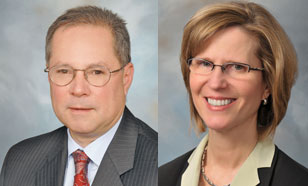Robert L Hickok

August 31, 2015 | The Legal Intelligencer
Roadmap for Litigating Price Impact at Class Certification StageOn July 25—13 months after the U.S. Supreme Court's landmark opinion in Halliburton v. Erica P. John Fund (Halliburton II), 134 S. Ct. 2398 (2014)—the U.S. District Court for the Northern District of Texas, on remand, issued its much-anticipated revised decision on the motion of lead plaintiff Erica P. John Fund Inc. for class certification in this 14-year-old securities fraud case. In Halliburton II, the Supreme Court held that, contrary to the opinions of the district court and the U.S. Court of Appeals for the Fifth Circuit below, at the class certification stage, a defendant may rebut the fraud-on-the-market presumption of reliance permitted under Basic v. Levinson, 485 U.S. 224 (1988), by demonstrating that an alleged misrepresentation had no impact on the corporate defendant's stock price.
By Robert L. Hickok and Gay Parks Rainville
9 minute read

June 02, 2015 | The Legal Intelligencer
District Courts Apply 'Omnicare' to Section 10(b) ClaimsIn the two months since the U.S. Supreme Court issued its landmark decision in Omnicare v. Laborers District Council Construction Industry Pension Fund, 135 S. Ct. 1318 (2015), several federal district courts have applied the court's new two-prong standard for determining opinion statement liability under Section 11 of the Securities Act of 1933 to claims of false statements of belief under Section 10(b) of the Securities Exchange Act of 1934.
By Robert L. Hickok and Gay Parks Rainville
5 minute read

June 01, 2015 | The Legal Intelligencer
District Courts Apply 'Omnicare' to Section 10(b) ClaimsIn the two months since the U.S. Supreme Court issued its landmark decision in , 135 S. Ct. 1318 (2015), several federal district courts have applied the court's new two-prong standard for determining opinion statement liability under Section 11 of the Securities Act of 1933 to claims of false statements of belief under Section 10(b) of the Securities Exchange Act of 1934.
By Robert L. Hickok and Gay Parks Rainville
5 minute read

March 03, 2015 | The Legal Intelligencer
Nvidia Investor Petitions Supreme Court to Resolve Circuit SplitOn Feb. 9, one of the plaintiffs in the federal securities class action against Nvidia Corp., Roberto Cohen, filed a petition for writ of certiorari with the U.S. Supreme Court, seeking review of the U.S. Court of Appeals for the Ninth Circuit's Oct. 2, 2014, decision affirming dismissal of the action, specifically, the court's holding that Item 303 of U.S. Securities and Exchange Commission (SEC) Regulation S-K does not create a duty to disclose for purposes of an omission actionable under Section 10(b) of the Securities Exchange Act of 1934 and SEC Rule 10b-5. Cohen's petition (Cohen v. Nvidia, Petition No. 14-975) argues that this holding by the Ninth Circuit in In re Nvidia Securities Litigation, 768 F.3d 1046 (9th Cir. 2014), conflicts with the Second Circuit's recent holding in Stratte-McClure v. Morgan Stanley, No. 13-0627, 2015 U.S. App. LEXIS 428 (2d Cir. Jan. 12, 2015), and the Third Circuit's 15-year-old decision in Oran v. Stafford, 226 F.3d 275 (3d Cir. 2000). Although the Ninth Circuit's opinion states that its holding regarding Item 303 disclosures is consistent, not in conflict, with Oran, a split among these circuits exists nonetheless.
By Robert L. Hickok and Gay Parks Rainville
8 minute read

March 02, 2015 | The Legal Intelligencer
Nvidia Investor Petitions Supreme Court to Resolve Circuit SplitOn Feb. 9, one of the plaintiffs in the federal securities class action against Nvidia Corp., Roberto Cohen, filed a petition for writ of certiorari with the U.S. Supreme Court, seeking review of the U.S. Court of Appeals for the Ninth Circuit's Oct. 2, 2014, decision affirming dismissal of the action, specifically, the court's holding that Item 303 of U.S. Securities and Exchange Commission (SEC) Regulation S-K does not create a duty to disclose for purposes of an omission actionable under Section 10(b) of the Securities Exchange Act of 1934 and SEC Rule 10b-5. Cohen's petition (, Petition No. 14-975) argues that this holding by the Ninth Circuit in , 768 F.3d 1046 (9th Cir. 2014), conflicts with the Second Circuit's recent holding in , No. 13-0627, 2015 U.S. App. LEXIS 428 (2d Cir. Jan. 12, 2015), and the Third Circuit's 15-year-old decision in , 226 F.3d 275 (3d Cir. 2000). Although the Ninth Circuit's opinion states that its holding regarding Item 303 disclosures is consistent, not in conflict, with , a split among these circuits exists nonetheless.
By Robert L. Hickok and Gay Parks Rainville
8 minute read

December 02, 2014 | The Legal Intelligencer
Dramatic Increase in Number, Magnitude of Whistleblower AwardsLast month, the U.S. Securities and Exchange Commission's Office of the Whistleblower released its 2014 annual report to Congress on the Dodd-Frank whistleblower program.
By Robert L. Hickok and Gay Parks Rainville
7 minute read

September 02, 2014 | The Legal Intelligencer
Non-U.S. Whistleblower's Dodd-Frank Retaliation Claim RejectedOn Aug. 14, the U.S. Court of Appeals for the Second Circuit issued a decision that helps clarify the territorial reach of the anti-retaliation provision of the Dodd-Frank Wall Street Reform and Consumer Protection Act, 15 USC Section 78u-6(h). In Liu Meng-Lin v. Siemens AG, No. 13-4385 (2d. Cir. Aug. 14, 2014), the court held that Congress did not intend the provision to apply extraterritorially to claims by a foreign whistleblower employed abroad by a foreign corporation where all events related to the whistleblower's disclosures occurred outside the United States. After affirming the district court's dismissal of Liu Meng-Lin's retaliation claim against Siemens AG on this ground, the court declined to address the additional argument advanced by Siemens that the Dodd-Frank anti-retaliation provision does not protect whistleblowers, like Liu, who fail to report potential securities violations to the U.S. Securities and Exchange Commission (SEC) before the alleged retaliation.
By Robert L. Hickok, Gay Parks Rainville and William A. Liess
7 minute read

June 03, 2014 | The Legal Intelligencer
Gov't Investigations, Suit Spotlight High-Frequency TradingRecent government investigations and a private lawsuit have turned a spotlight on the securities trading practice known as "high-frequency trading" or HFT. As a result, the practice has become one of the most talked about, yet least understood, subjects in the corporate legal industry.
By Robert L. Hickok, Gay Parks Rainville and Min Choi
8 minute read

March 04, 2014 | The Legal Intelligencer
SEC Exposes Teeth of Dodd-Frank Whistleblower RulesIn recent months, the U.S. Securities and Exchange Commission (SEC) has proactively reassured investors that it is enforcing its rules that implement the "Securities Whistleblower Incentives and Protection" provisions of the Dodd-Frank Wall Street Reform and Consumer Protection Act, set forth in Section 21F of the Securities Exchange Act of 1934.
By Robert L. Hickok and Gay Parks Rainville
7 minute read

December 03, 2013 | The Legal Intelligencer
Fraud-on-the-Market Presumption of Reliance May Be OverruledOn Nov. 15, the U.S. Supreme Court granted Halliburton Co.'s second petition for writ of certiorari in the Erica P. John Fund v. Halliburton, No. 13-317, securities litigation, this time to consider whether to "overrule or substantially modify the holding of Basic v. Levinson, 485 U.S. 224 (1988), to the extent it allows a presumption of classwide reliance under the fraud-on-the-market theory," and, if the court does not overrule Basic, to decide whether a defendant "may rebut the presumption and prevent class certification by introducing evidence that the alleged misrepresentations did not distort the market price of its stock."
By Robert L. Hickok, Gay Parks Rainville and Min Choi
7 minute read
Trending Stories
- 1‘Badge of Honor’: SEC Targets CyberKongz in Token Registration Dispute
- 25 Longtime Broward County Judges Set to Retire by End of 2024
- 3Top Five Florida Settlements of 2024
- 4Black, Hispanic Law Student Enrollment Falls at Top 14 Following End of Affirmative Action, but Mostly Improved at California's Top Schools
- 5Justices Wade Into South Carolina's Medicaid Fight With Planned Parenthood
More from ALM
- Scan In Progress: Litigators Leverage AI to Screen Prospective Jurors 1 minute read
- Legal Speak at General Counsel Conference East 2024: Match Group's Katie Dugan & Herrick's Carol Goodman 1 minute read
- Legal Speak at General Counsel Conference East 2024: Eric Wall, Executive VP, Syllo 1 minute read



